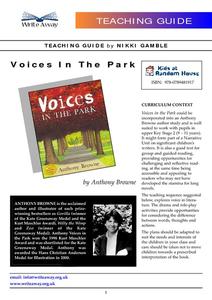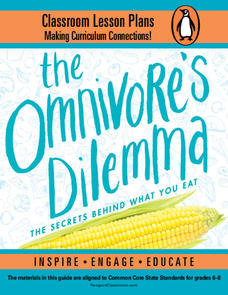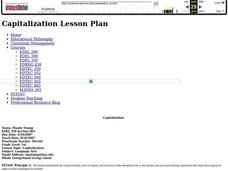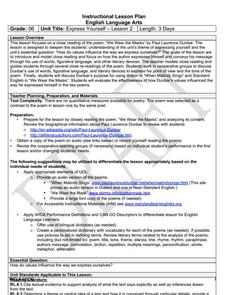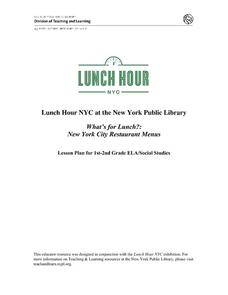Penguin Books
Core Curriculum Lesson Plans for The Lions of Little Rock
Schools in the 1950s and 60s looked very different from the schools we know today. An educator's guide explores the civil rights movement and, specifically, the process of integrating schools. Questions cover key themes in the novel and...
Write Away!
Voices In the Park
Explore the impact a narrator's point of view has on a story with a reading of the children's book, Voices in the Park by Anthony Browne. Written in four different voices, the story is told and retold from different perspectives to...
Field Museum
The Case of Darwin's Finches
One of the most striking pieces of evidence for Darwin's Evolution of Species was his observations of finches and how their beaks differed from island to island, depending on their primary food sources. So what would happen to the theory...
Hawaiʻi State Department of Education
Chiaroscuro Apple
I absolutely love this idea. Kids explore the chiaroscuro technique as they draw, then bite, then write about an apple. They discuss chiaroscuro, depth, shade, perspective, and texture. Then they draw their apples, write a descriptive...
Speak Truth to Power
Harry Wu: Forced Labor
Over the course of two class periods, young historians explore human rights issues; specifically, forced labor in China. This resource provides everything you need, including relevant vocabulary, an anticipatory activity, and a...
Curated OER
Ethos, Logos, and Pathos in Civil Rights Movement Speeches
Examine three speeches while teaching Aristotle's appeals. Over the course of three days, class members fill out a graphic organizer about ethos, pathos, and logos, complete an anticipatory guide, read speeches by Martin Luther King Jr.,...
Penguin Books
The Omnivore’s Dilemma, Young Readers Edition
As the saying goes, you are what you eat. A useful set of lesson plans encourage young readers to take a second look at their eating habits. Pre- and post-reading questions bring in reflective writing and discussion while extension...
Penguin Books
Addressing Text Complexity - Making Independent Reading Meaningful
Many English teachers dream of a classroom full of readers silently enjoying their books. A useful guide helps make that dream become a reality by providing book recommendations for a range of readers. Each suggestion includes the...
Curated OER
Capitalization
Teach your class the rules of capitalization with this fun, engaging lesson. Children participate in a learning activity, collaborate with peers, and practice their writing as they learn three specific rules: to always capitalize the...
Curated OER
6th Grade: Express Yourself, Lesson 2: Close Read
The second activity of a pair about Paul Laurence Dunbar, this plan focuses in particular on his poem, "We Wear the Masks." After a short historical introduction, class members conduct a series or readings, marking up the text and...
New York Public Library
What's for Lunch?: New York City Restaurant Menus
Do you remember the days when a cup of coffee cost five cents? At A.W. Dennett restaurant in 1894, you could buy a five-cent cup of coffee and as well as a five-cent slice of pie to accompany it. The menu from that year is a primary...
Curated OER
Toulmin Argument Essay
After viewing a Prezi presentation on Toulmin’s argument, (claim, reason, warrant, backing, grounds, qualifiers, rebuttals), groups re-examine the format, and then individuals craft an argument essay in response to Lord Chesterfields...
Curated OER
Character Analysis and The Crucible
Readers of The Crucible use a SATDO chart to collect evidence they will use to craft interpretive statements and an analysis of one of Miller’s characters. Background information on the play and about Miller, links to handouts,...
EngageNY
Introducing “Comprehending the Calamity”
Some things are beyond comprehension. Scholars read an excerpt from "Comprehending the Calamity," a primary source text about the 1906 San Francisco earthquake. After identifying the gist, pupils complete anchor charts to analyze how the...
Pulitzer Center
"Voices from Haiti": Using Poetry to Speak up for a Cause
Explore a real world use of poetry with your class! Young language arts pupils consider the concept of advocacy and how journalism, photography, and poetry can raise awareness for a cause. They read several poems about individuals...
McGraw Hill
Study Guide for Island of the Blue Dolphins
Dive your class into a reading of Island of the Blue Dolphins with this in-depth study guide. Breaking the novel into three parts, the resource begins each section with a focus activity that identifies a specific theme or question to be...
Meadows Center for Preventing Educational Risk, University of Texas at Austin
Lesson 6 - Vowel-Consonant-E Syllables
Adding an e sometimes significantly changes the pronunciation of a word. An informative lesson introduces Vowel-Consonant-E syllables by helping learners see the difference between the pronunciation of words like mop and mope. A script...
PBS
Figurative Language and Foreshadowing in The Outsiders
S.E. Hinton's The Outsiders is still relatable to teenagers today, even though it was written more than 50 years ago. Explore how the figurative language of the story works to establish characterization, and how foreshadowing lays out...
Pixton Comics Inc.
Elements of an Epic
Mythic heroes, gods and goddesses, and epic tales come alive as young artists craft their own graphic novel or mind map for classic epics, including The Odyssey, Beowulf, Harry Potter, and Star Wars, identifying the six elements of every...
PBS
A Time and Place: The Importance of Setting in To Kill a Mockingbird
A strong community acts as a family during difficult times. The evidence for the family aspects of Maycomb is abundant in Harper Lee's To Kill a Mockingbird, and it is the focus of a lesson plan on the importance of setting as it relates...
Curated OER
Knights of the Round Table adapted by Gwen Ross
Everyone loves the tales involving King Arthur and his knights. After reading Knights of the Round Table by Gwen Gross, learners draw inferences and conclusions, analyze story elements, and discuss figurative language, including...
Curated OER
Greed is Good?
From Mr. Merdle to Mr. Madoff? A viewing of the PBS adaptation of Charles Dickens’ “Little Dorrit” launches an examination of greedy characters in literature and a study of greed, unfairness, and economic hardship today. The richly...
Curated OER
Modern Minstrelsy: Exploring Racist Stereotypes in Literature and Life
Satires may be designed to expose a bias to ridicule but if misunderstood can they reinforce that bias? Langston Hughes poem, “Minstrel Man” opens a discussion of racist stereotypes, the minstrel tradition, and the musical, “The...
Curated OER
The Hobbit
Here’s a series of exercises designed to be used after readers have finished reading The Hobbit. Pairs identify the speaker of a series of quotes, match characters with qualities, and provide evidence from the story to support their...



